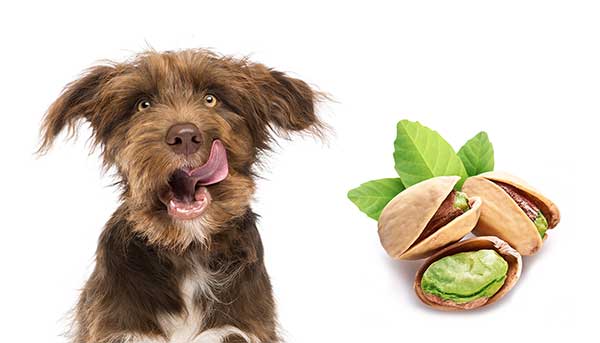Pistachios and dogs – not one of the best combinations if you asked some pet parents out there. Some dog owners have been conditioned to believe that nuts, like all plant-based foods, are unideal for dogs. Well, there’s a lot of truth to that.
However, not all nuts are considered toxic or unhealthy for dogs. For instance, the love affair between dogs and peanut butter is unmistakable. As a matter of fact, many vets encourage offering peanut butter to our canine friends once in a while, since these nuts come with a dense nutritional profile.
Pistachios are other common nuts that dogs generally love. You could be enjoying your favorite pistachio snack and leave the table momentarily, only to find that your pooch has downed the rest of the snack.
If you’re not already familiar with the information on the health and safety of pistachios for dogs, you may be left wondering if your canine friend will drop dead the next minute. But can dogs eat pistachios?
The simple answer is yes, dogs can eat pistachios. Unlike various other nuts, pistachios are not immediately toxic to dogs. The nuts are loaded with essential minerals and vitamins that your pooch can benefit from. However, pistachios also tend to be high in fats and salt, which means that you should only feed these nuts to your dog in moderation.
So, maybe you’ve always wondered, can my dog eat pistachios?
As we’ve just mentioned, pistachios are perfectly safe for dogs. But considering that these nuts are plant-based foods, there are a few precautions to take before offering them to your dog.
A Brief History About Pistachios
One of the frequently asked questions among many pistachio-loving dog owners is, ‘my dogs ate a pistachio and I’m concerned, are pistachios good for dogs?’
Pistachios, like peanuts and a few other nuts, are not toxic to dogs. But before we delve into the possible health benefits and potential risks of feeding pistachios to dogs, let’s begin easy by understanding just what these nuts are.
Pistachio nuts basically refer to the nuts that grow on the pistachio tree. Pistachio tree is a small tree that belongs in the cashew family. The tree traces its origin in Central Asia and the Middle East, particularly in Iran, Uzbekistan, and Afghanistan.
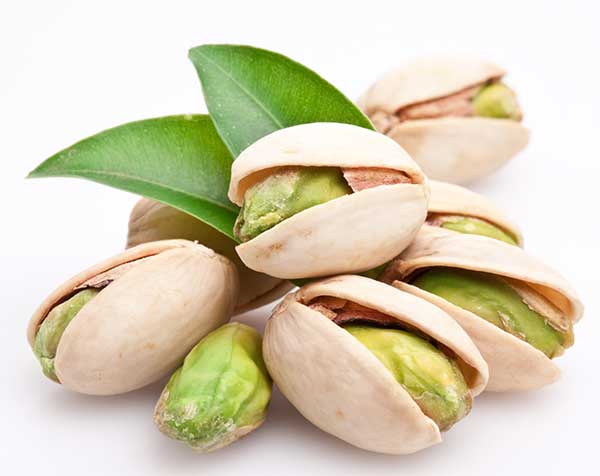
According to archeological evidence, pistachio nuts were used as edible products as early as 6750 BCE. However, the ancient pistachios were probably different from modern ones.
Research indicates that the cultivation of the modern pistachio tree, scientifically known as Pistacia vera, might have begun in the Bronze Age Central Asia.
In Europe, the earliest evidence of pistachio cultivation suggests that these nuts may have been introduced in Syria, Italy, and Hispania around 700 BCE. The mysterious Hanging Gardens of Babylon is said to have been teeming with pistachio trees.
In the US, pistachio was cultivated for commercial purposes from 1854, where it was mainly grown as an ornamental garden tree. The popularity of pistachios in the US rose fast and furious, so much that February 26th was designated as the National Pistachio Day. Today, the US is a major global exporter of pistachio nuts, rivaled only by Iran.
Since pistachios are now widespread all over the world, it’s not unusual to find some dog owners readily wanting to share these nuts with their canine friends. But the question remains, are pistachios safe for dogs? The following sections shall shed more light on that.
Last update on 2025-01-12 / Affiliate links / Images from Amazon Product Advertising API
Quick Facts About the Types of Pistachios to Offer to Your Dog
All pistachios are not made equal. So, if you’re considering feeding these nuts to your pooch, you should first understand which types of pistachios are generally safe for your dog.
As with most dog-friendly nuts, the following are some of the precautions to take before offering pistachios to your dog;
✔ Never give your dog pistachios that are still in their shells.
✔ If you’re buying commercially-ready pistachios, read the ingredients list to ensure that the product doesn’t contain too much salt, sugar, fat, or spices like garlic and onions.
✔ Avoid candy-coated or chocolate-covered pistachios.
Most importantly, always offer pistachios to your dog in moderation.
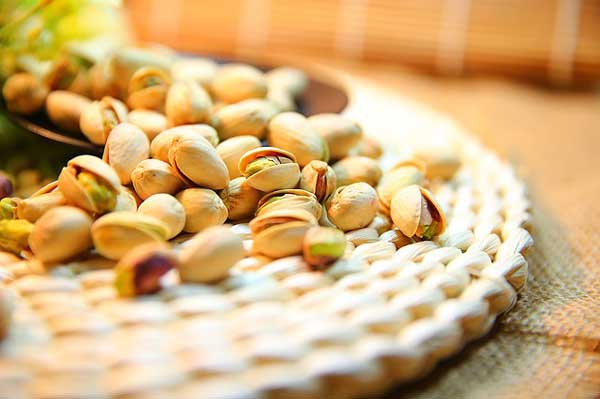
But just how many pistachios can a dog eat?
There’s no hard and fast rule on the number of pistachio nuts to feed your canine friend. Essentially, the amount of pistachio that you feed your dog should be relative to the dog’s size.
Can little dogs eat pistachios?
Now, owners of small dog breeds like Chihuahuas and Yorkies may be wondering if their dogs can also snack on pistachios. So, can Chihuahuas eat pistachios? And what about Yorkies, can Yorkies eat pistachios?
The answer is yes to both questions. The only difference is that since Yorkies and Chihuahuas are small dogs, they should generally eat smaller amounts of pistachios compared to their larger counterparts.
👉 For comparison’s sake, half a pistachio nut may be okay for your Chihuahua or Yorkie, as opposed to three or four nuts for larger breeds like the Great Dane.
ALSO READ: Can Dogs Eat Cashews? Is It Safe to Share?
Possible Health Benefits of Pistachios for Dogs
Are pistachios ok for dogs? Yes, as it has now become abundantly clear, pistachios are safe for dogs. There are numerous health and nutritional benefits that your pooch can enjoy from snacking on pistachio nuts occasionally.
First up, here’s the nutritional profile of a 1-ounce (approximately 28 grams) of pistachio nuts;
- Calories: 159
- Carbs: 8 grams
- Protein: 6 grams
- Fat: 13 grams, 90% of which are unsaturated fats
- Fiber: 3 grams
In addition to the above nutrients, pistachios are also loaded with other minerals like potassium, phosphorus, copper, manganese, iron, calcium, zinc, selenium, folate, and many B-vitamins (including thiamin and Vitamin B6).
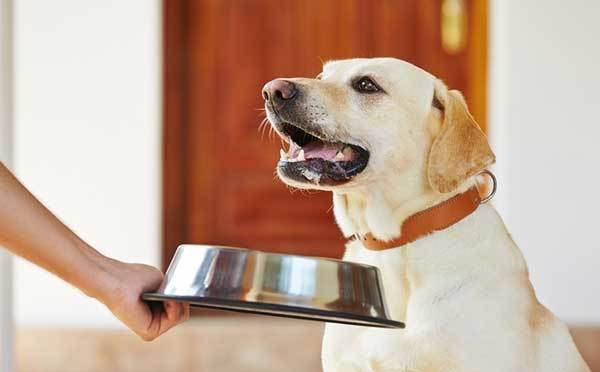
The following are some of the ways your dog might benefit from eating pistachio nuts;
1. Contain Dietary Fiber
One of the main benefits of feeding pistachios to your dog is that the nuts are loaded with dietary fiber. Even better is the fact that pistachios contain both soluble and insoluble fibers. There are four basic functions that dietary fiber may perform in your dog’s body.
First, these fibers nourish your dog’s gut-friendly bacteria. Basically, gut-friendly bacteria refer to the bacteria that live throughout your dog’s digestive tract.
These bacteria play major roles in food digestion, including the fermentation of fiber into the healthier short-chain fatty acids. Short-chain fatty acids like butyrate have been linked to reduced risks of developing digestive issues.
Secondly, dietary fibers are known for their ability to add bulk to stool, thereby improving bowel movements. That makes pistachio nuts an excellent addition to your dog’s food if the dog is battling with digestive conditions like constipation and flatulence.
Dietary fiber is also known to create a sense of fullness. By sprinkling a small amount of pistachio on your dog’s food, the dog eats less but feels fuller for longer. Therefore, pistachios are instrumental in regulating the food portions that your canine friend consumes as a way of guarding against weight gain.
Lastly, the dietary fiber in pistachios may also help to promote good cholesterol while inhibiting the effects of bad cholesterol. By regulating the levels of bad cholesterol in the dog’s body, pistachios contribute significantly to a healthier heart and cardiovascular system.
- Support Fido’s Tummy – These functional soft chew supplements have a base of pumpkin and papaya (sources of enzymes) plus probiotics for digestion,…
- Features Clinically Studied DE111 Probiotic – This chewable functional supplement contains DE111, a clinically studied Bacillus subtilis that supports…
- Six-Strain Probiotic Powder Blend – These chewables contain six probiotics (live bacteria) that support gut function and proper gut flora for support…
Last update on 2024-12-29 / Affiliate links / Images from Amazon Product Advertising API
2. Loaded With Antioxidants
Pistachios are rich in antioxidants that play a role in boosting your dog’s immunity by preventing the oxidative damage to body cells occasioned by free radicals.
According to research, pistachios rank third as the nuts with the highest number of powerful antioxidants, coming only after walnuts and pecans.
Pistachio nuts are abundant in antioxidants like lutein, γ-Tocopherol, zeaxanthin, polyphenols, and tocopherols, which are cited for their antibacterial, antiviral, antifungal, anti-inflammatory, and antitumor effects.
Collectively, these antioxidants can help to prevent the onset of various chronic diseases, such as cancer, diabetes, heart disease, arthritis, macular degeneration, etc.
ALSO READ: Can Dogs Eat Sunflower Seeds? Safe To Share Or Not?
3. Regulate Blood Pressure
Another way your pooch can benefit from eating pistachios is that the nuts can lower the dog’s blood pressure. One of the ways pistachios lower your dog’s blood pressure is through their vasodilation properties.
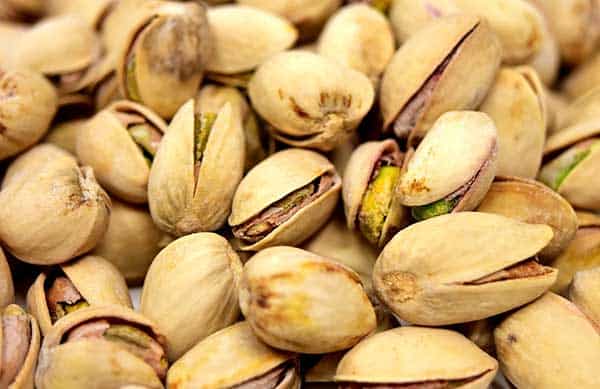
Pistachios contain amino acids like L-arginine. After ingesting pistachios, your dog’s body converts L-arginine to nitric oxide which dilates the dog’s blood vessels, promoting blood flow.
Now, blood pressure happens to be the major risk factor for heart disease. So, by regulating your dog’s blood pressure, pistachios directly decrease the risks of heart disease and other cardiovascular conditions.
It’s also worth mentioning that pistachios generally have a low glycemic index. Therefore, you can offer the nuts to your dog without worrying about your canine friend suffering sudden blood sugar spikes. That makes pistachios an excellent choice for dogs with blood sugar conditions like diabetes.
Other potential health benefits of pistachios for dogs depends on the amounts of individual minerals that the nuts contain. For instance;
✔ B-vitamins like niacin, thiamin, riboflavin, pantothenic acid, and pyridoxine help with the metabolism of macronutrient molecules.
✔ Calcium helps in the building and maintenance of healthy bones, as well as muscle contraction.
✔ Phosphorus also plays a role in the formation and maintenance of bone structure, density, and integrity. Phosphorus might also improve your dog’s cognitive function.
✔ Copper boosts the production of red blood cells and improves the functions of the nerve cells.
✔ Iron facilitates the formation of hemoglobin, which helps in the transportation of oxygen to various cells, tissues, and organs in the dog’s body.
✔ Zinc is cited for its immune-boosting effects.
✔ Magnesium is known for its ability to regulate the balance of potassium, sodium, and calcium ions in the body. It’s also an effective mineral against muscle spasms and may help to mediate spasticity in dogs.
✔ Manganese may boost the functions of your dog’s central nervous system. It also plays a fundamental role in the production of connective tissues and blood clotting factors, as well as the formation of bones and sex hormones.
Evidently, there are numerous possible health benefits of pistachios for dogs. But as you may expect, there are equally potential risks of feeding these nuts to your pooch.
- HEALTHY, TASTY & NATURAL: Our homestyle, soft, oven-baked dog treats are made in the USA using the same natural, healthy and wholesome ingredients you…
- INGREDIENTS: Our base ingredient is oatmeal, making these treats easier to digest than other grains. All soft-baked treats are wheat and corn-free.
- PERFECT TRAINING TREAT: Treats easily break apart, so they can be enjoyed by dogs of all breeds, ages and sizes. Try sprinkling them over your dog’s…
Last update on 2024-12-30 / Affiliate links / Images from Amazon Product Advertising API
The following section captures some of the things that could go wrong if you offer more pistachios to your dog than you should.
Potential Risks of Pistachios to Dogs
1. High Fat and Calorie Content
This is arguably the greatest concern when it comes to feeing pistachios to dogs. High fat and calorie content is directly linked to weight gain and other weight-related issues. Fatty foods like pistachios might also cause pancreatitis in dogs.
Pancreatitis refers to a medical condition that results from the inflammation of the pancreas, the organ located near the stomach that aids in food digestion and regulation of blood sugar levels.
If your dog is lucky, pancreatitis may come and go even without you noticing any symptoms. But in most cases, the condition tends to linger a bit longer.
Some of the symptoms of pancreatitis in dogs include;
✔ Gastrointestinal complications like nausea and vomiting, loss of appetite, diarrhea, and abdominal pain.
✔ Dehydration, as is characterized by dry eyes, nose, skin, and poo, as well as infrequent urination.
✔ Fever and/or chills.
✔ Fatigue.
✔ Labored breathing.
✔ Irregular heartbeat.
If you notice any of the above symptoms a few hours after your dog has eaten pistachios, you should seek urgent medical intervention. Your vet will examine the dog and determine the right course of treatment.
Pancreatitis treatment typically begins with administering IV fluids in case your dog is severely dehydrated. After that, the vet may prescribe medications to curb other specific symptoms of the condition.

Now that pistachios are laden with fat and calories, will pistachios hurt dogs?
Most importantly, can pistachios kill dogs? Well, pistachios may not immediately hurt your dog and the nuts will unlikely kill your pooch.
While pistachios are significantly high in fats and calories, there’s a saving grace. The fat content in natural pistachios comprises 90% monounsaturated fatty acids, which are lauded for their antioxidant and anti-inflammatory properties.
2. High Fiber Content
Pistachios are loaded with dietary fiber, which, as we already highlighted, comes with a cocktail of potential health benefits for your dog.
However, there’s a dark side to fiber-rich foods that’s commonly ignored. If fed to dogs in large quantities, fiber produces laxative effects. So, instead of bulking your dog’s stool, the fiber content in pistachios could induce diarrhea and vomiting.
Now, one of the common related questions regarding pistachios and dogs is, do pistachios make dogs sick?
The answer is yes, pistachios can make your dog sick, thanks to the ability of these nuts to trigger diarrhea and vomiting.
- ACTIONABLE HEALTH INSIGHTS: Test for over 270 genetic health conditions and get actionable insights to help you give your pup the best care possible….
- MOST ACCURATE BREED IDENTIFICATION: Test for over 350 dog breeds including dingoes, coyotes, wolves, and village dogs. Using a research-grade…
- TRAIT INSIGHTS THAT HELP YOU BE MORE PREPARED: Test for 55 physical traits. Size, coat, grooming needs — your dog’s traits don’t just make them…
Last update on 2025-01-13 / Affiliate links / Images from Amazon Product Advertising API
3. High Salt Content
Salt is a common additive in commercially-prepared pistachio products, where it’s usually added as a condiment. However, salt ranks high among some of the foods that dogs should not eat. High salt content in your dog’s body could lead to a condition known as salt/sodium ion poisoning.
Sodium ion poisoning produces the following symptoms;
- Nausea
- Vomiting
- Diarrhea
- Loss of appetite
- Abdominal pain
- Dehydration
- Frequent thirst sensation and urination
- Fatigue
- Incoordination
- Seizures and tremor
So, can dogs eat salted pistachios? No, salted pistachios are a major risk factor for sodium ion poisoning. If left untreated, salt ion poisoning could lead to coma and eventually kill your dog.
Can dogs eat unsalted pistachios then? Yes, unsalted pistachios are way healthier for dogs than salted pistachios.
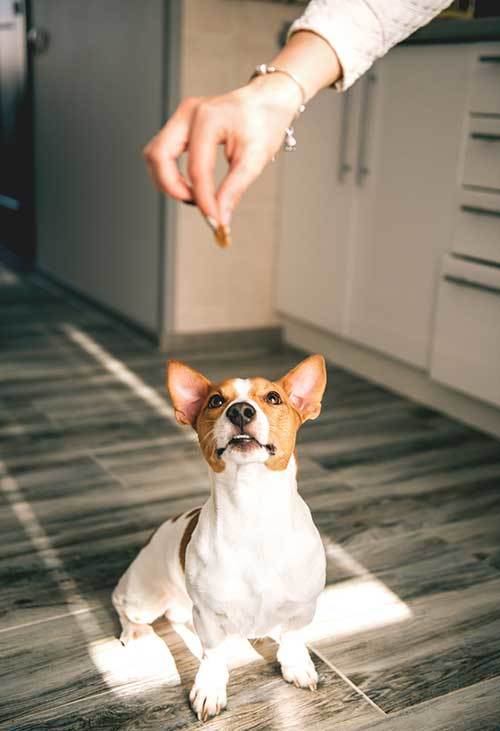
4. Sweeteners
Most sweeteners, also known as flavor enhancers, are just as toxic to your dog as salt is. The common sweeteners you’ll find in pistachios include sugar, chocolate, or xylitol. While these flavor-enhancers are safe for humans, experts discourage feeding pistachios containing any sugar or chocolate to dogs.
Chocolate contains the chemical theobromine, a toxin that can stimulate your dog’s nervous system as well as elevate its heart race.
Besides being a risk factor for weight gain and tooth decay, excess sugar in your dog’s body might also cause conditions like heart disease and diabetes. The presence of sugar in pistachios is the primary reason you shouldn’t feed pistachio ice cream, pudding, or muffins to your dog.
So, maybe you’ve always been wondering, can dogs eat pistachios ice cream? If not, can dogs eat pistachio pudding? And what about pistachio muffins, can dogs eat pistachio muffins?
The answer to all the three questions is a resounding no. By virtue of their high sugar content, pistachio pudding, ice cream, and muffins aren’t ideal for dogs.

Other potential risks of feeding pistachios to dogs include;
✔ Choking hazards, especially from eating unshelled pistachio nuts. Some dog owners usually ask, can dogs eat pistachio shells? Well, pistachio shells are not recommended for dogs. In addition to being a choking hazard, unshelled pistachios may also tear your dog’s delicate digestive tissues, considering that they’re hard and difficult to pass.
✔ Onion/garlic poisoning, especially if the dog eats pistachios that are seasoned with either of these spices.
✔ Urushiol, which is an oily liquid in pistachios, is associated with allergic reactions.
✔ Some pistachios may contain aflatoxin, a chemical that’s associated with carcinogenic properties.
There could be other potential risks of pistachios to dogs, depending on how the nuts are cultivated, harvested, and prepared. When it comes to the mode of preparation, you can either offer the nuts to your dog fresh or roasted. So, can dogs eat roasted pistachios?
Absolutely. However, when roasting pistachios for dogs, avoid adding too much salt or fat.
There’s also the question of puppies and whether they can snack on pistachios or not. But can puppies eat pistachios?
The answer is – not recommended. That’s primarily because puppies have more sensitive stomachs that may not process pistachios well.
Conclusion: So, are pistachios poisonous to dogs?
No, they aren’t. But while pistachios aren’t toxic to dogs, some of the ingredients used may not necessarily be safe for your pooch. This underscores the importance of reading the ingredients list before buying pistachios from your local supermarket.
Better yet, you can invest in safer and healthier alternatives to pistachios for dogs, such as cashews, hazelnuts, and almonds.
Checkout Our Favorite Dog Products
1. BEST FOOD FOR DOGS AND PUPPIES
We Like: Victor Super Premium Pet Food – Ideal for growing puppies and pregnant or lactating females. Also provides sustained energy for sporting dogs and dogs with high physical demands.
2. BEST DOG TRAINING PROGRAM
We Like: Doggy Dan The Online Dog Trainer – Stop any dog problem and raise the perfect puppy with The Online Dog Trainer.
3. BEST DOG DNA TEST
We Like: Embark Dog DNA Test – Embark screens for over 250 dog breeds + tests for 170+ genetic diseases including MDR1 drug sensitivity, glaucoma, degenerative myelopathy, and dilated cardiomyopathy, some of the most common adult-onset diseases in dogs.

